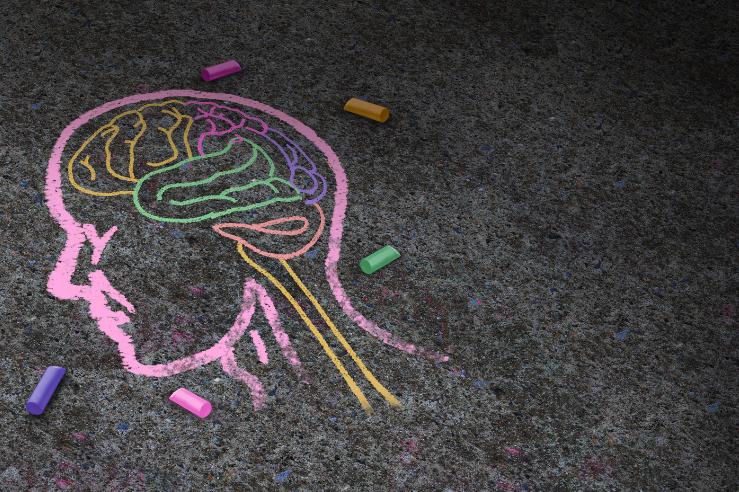Let’s face it: Worry over the constant barrage of coronavirus news is stressing a lot of us out.
And it’s not just health care workers on the front lines who are feeling it. Children and their adult caregivers are at risk of displaying signs of trauma, too.
We checked in with Heather Dahl -- an assistant professor with the department of Counselor Education, School Psychology, and Human Services at UNLV’s College of Education -- to get details on the stress symptoms displayed by children and adults, as well as strategies and outside resources to help combat them. Here’s what she had to say:
What are signs a child or adult is having trouble coping with the stress surrounding the coronavirus pandemic?
The COVID-19 crisis can bring about many feelings and behaviors in children and their families. Children and their adult caregivers can often present with crisis and trauma stress differently. And the reactions to traumatic events can vary among individuals. Children may understand less about what is going on around them and may not feel a sense of control.
When signs of trauma are present, both children and adults may exhibit any of the following:
-
Sleep disturbance
-
Physical symptoms (e.g., stomachaches, headaches, bed wetting)
-
Intrusive memories
-
Unwanted thoughts
-
High anxiety
-
Depressed mood
-
Frustration
-
Crying
-
Anger and aggression
-
Loss of interest in activities they would normally enjoy
-
Changes to eating behaviors
-
Changes to relationships
-
Inability to concentrate
-
Increased withdrawal
-
Heightened fear (e.g., safety, danger, death, being alone)
-
Suicidal ideation
Additionally, children might display increased attachment to their caregivers whereas adults might experience inconsistent work performance.
What are some strategies to lessen stress brought on by the pandemic?
When processing traumatic events with family members, it’s important to remember that previous trauma and one’s current living situation may impact how caregivers are able to work through family member symptoms. Strategies for families to minimize the short and long-term effects include:
- When speaking to children about COVID-19, use age appropriate language that includes factual information and is conveyed in a calm and consistent matter
- Consider reducing screen time focused on COVID-19
- Provide safety reassurance (e.g., environment, home)
- Co-create a daily routine (e.g., schoolwork, bedtime, play time)
- Allow for extra time with children throughout the day as you are able to
- Reduce social isolation through multimedia (e.g., cell phone, web conferencing)
- Be empathic to fears and provide space for children and adults to express themselves
- Make space in conversations to discuss the current events with your family
- Caregivers should pay attention to their own emotional well-being and physical health and seek out assistance as needed/able
- Reach out to emergency services immediately if any member of your family presents with suicidal ideation or a desire to harm others.
Do you have reading material or organizations you’d suggest for help or more information?
The American Counseling Association has some great articles on Disaster and Trauma Responses of Children, Disaster and Trauma Effects on Parents, and Sheltering in Place Resources. The Centers for Disease Control published Talking with children about Coronavirus Disease 2019: Messages for parents, school staff, and others working with children. And the Vegas Stronger Resiliency Center has a page dedicated to COVID-19 mental health resources, while 7 Cups and Mood Lifters offer online emotional and peer support services.
In an effort to support the Stay Home for Nevada initiative, several counseling agencies are providing telehealth services in our community. They include:
The PRACTICE, a UNLV mental health clinic that offers counseling and other services to campus and community members. Visit The PRACTICE website for information.
United Citizens Foundation (UCF), a nonprofit that specializes in healthy emotional and behavioral skills for children and their families with onsite mental and behavioral wellness centers in the community. Please call (702) 888-6300 for scheduling.
Red Rock Counseling offers counseling services to individuals, couples, and families with mental health needs: relationships, depression, anxiety, loss, childhood trauma, relating to others, the stress of everyday life, and substance abuse. Visit Red Rock Counseling website to book an appointment.
Perceptions Counseling Center of Southern Nevada offers counseling services to individuals, families, caseworkers, schools and any other representatives per the client’s consent to provide the best wraparound service they can offer. Please visit the center's website for more information or call 702-850-8700.
In addition, these crisis hotlines are available:
Substance Abuse and Mental Health Services Administration Disaster Distress Helpline
1-800-985-5990, Text ‘TalkWithUs’ to 66746; Spanish speakers: Text ‘Hablanos’ to 66746
National Suicide Prevention Lifeline
1-800-273-TALK (8255)



